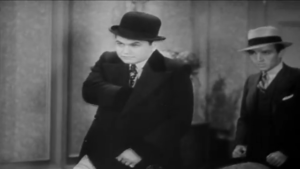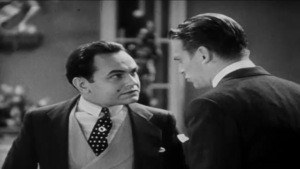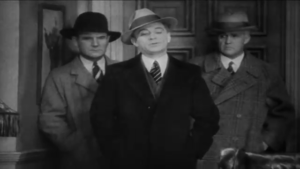Rating: 4.5 out of 5




![]()
Before there was The Godfather, The Untouchables, or even Goodfellas, the first gangster movie to come out was Little Caesar. Back in 1931 and 1932, three films started the gangster genre, and Little Caesar was the first to come out. Little Caesar was the first to put an immortalized image on the real-life gangsters of Al Capone, John Dillinger, Baby Face Nelson, Machine Gun Kelly, and Bugsy Siegel. Those were the original gangsters right there. The fedora hats, three-piece suits, trench coats, riding around in those boxcars with machine guns spraying bullets everywhere, robbing banks, or even escaping jail. It was definitely a time where the crime was severe in the United States, and many of the ones above were called Public Enemy #1.
Director Mervyn LeRoy, along with stars Edward G. Robinson, Douglas Fairbanks Jr., and Glenda Farrell, provides a tale that is very common in today’s films. The film is entertaining and engaging with little violence compared to its contemporaries like Scarface and Public Enemy. Yet it is a film that has many elements of Shakespeare if you look hard enough. From the novel by W.R. Burnett, LeRoy and the writers come up with a movie that shows the quick rise but inevitable fall of a crime boss. One that was so full of pure ambition. It is honestly a very familiar story.

Little Caesar is the tale about the bottom of the totem pole criminal, Caesar Enrico “Rico” Bandello, played Edward G. Robinson. Rico is having a conversation with his friend, Joe Massara, played by Douglas Fairbanks Jr. Caesar and Joe have just moved to Chicago, seeking fortune. During their conversation, Rico has recently joined a gang run by Sam Vettori and states he wants to be the boss. The boss of bosses and have everything run through him while Joe stated he wants to get out of organized crime and become a dancer with his new girl Olga who is also a dancer. Rico becomes increasingly involved with his gang as Joe tries to drift away. Rico bows down to no man or even his boss. He questions everything that they do, and his go-to saying is, “They are soft when the tough gets going.” Dude is straight up intense. Rico and the gang decided to rob a night club with specific orders from underworld overlord “Big Boy,” played by Sidney Blackmer, to avoid any bloodshed. Rico, like the crazy man that he is, guns down the crime commissioner Alvin McClure during the robbery. Rico didn’t even hesitate. Saw the dude and pulled the trigger like no consequences were going to happen. A stupid boss move. Yet, Rico returns to his boss’ gang, and straight-up takes over the organization while calling the former boss soft. If that isn’t a boss move, then nothing is. With control of one gang, Rico sets his sights on bigger fish with the hope of one day controlling everything. This little man’s ego spreads a wide and sadistic shadow overall he sets his eye upon.

The primary and best aspect of this film is the star. Edward G. Robinson is phenomenal as Caesar Enrico “Rico” Bandello. Robinson is electric, cunning and demands the screen each time he is on. Rico has that nasally, voice that all the cartoon gangster copy, and yet, he was a boss. With each scene, Robinson brings Rico more and more to life as you watch the gangster make his way up the ranks. As the story progresses, Robinson shows that Rico’s ambition but ego might be bigger than his attitude can cash but also a way that makes you not like the character. Robinson shows Rico as that person with the shifty, beady eyes that seems to have a smirk on their face, patiently waiting for their opportunity to strike and take your place.
An example of this is when the gang Rico is part of goes and robs the night club. Rico takes it upon himself to shot the crime commissioner. While being berated by his boss, straight up tells his soon-to-be-boss, “you can dish it out, but it’s getting so you can’t take it no more. You’re through.” and takes his gang right from him. It was like, “You a punk, and everything you had is mine, so get out of here and don’t come back.” Yet, Robinson continues to show Rico’s ambition but also stupidity when the crime boss has made it. When Rico is at a party for himself, full of smiles, he gets his picture taken while a member of the crime syndicate states he never gets his picture taken. Rico brushes him off like a fool. The best was how Robinson completes the cycle while shown the fall of Rico. As the heat has come on to Rico, he goes on the run, much in the way as he states everyone is soft and can’t take it. Yet he is now one of those people he despises so much. Robinson presents Rico as a man who has lost everything. His clothes are disheveled, he drinks heavily and slurs and sleeps in a flophouse. He has officially become a loser. He loses his mind when he hears the cop pursuing him while calling him a coward and being what he claims others are.

Yet the movie ends in the opposite of the way it happens. One that shows life can have a funny way of turning out for some people. The once loved, and appreciation that Rico felt is all but gone. He is chased down by the cops and finally gun downed. Robinson finishes his magnificent performance as Rico by Rico trying to run from the police only to utter his last words, “Mother of mercy, is this the end of Rico?” Yet as the picture pans out, Rico’s last words are under the poster of a film of his former best friend has just made.
Even though this movie isn’t as violent, it is truly a thrill to watch as the first gangster film to come out. We all have seen the rise and fall of many figures in the movie, but this is where it truly started. Robinson gives a performance of a lifetime and one that truly makes you appreciate this all-time classic.